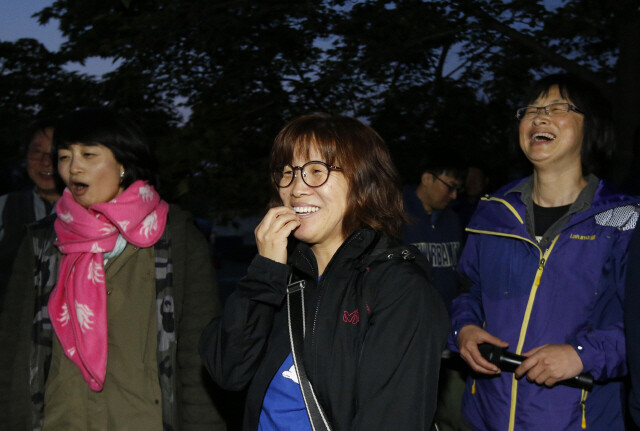hankyoreh
Links to other country sites 다른 나라 사이트 링크
Why do some inmates get out just after midnight, whiles others have to stay till 5 am?

Yu Heung-hee was released at 5 am on May 12 from the Seoul Detention Center. The leader of the Kiryung Electronics chapter of the Korean Metal Workers’ Union (KMWU), Yu had completed a sentence of 14 days of labor after protesting a fine decision he considered unjust.
On Apr. 29, Yu decided to accept labor in jail instead of paying a fine for “breaking and entering” for ringing the doorbell of Kiryung CEO Choi Dong-yeol, who had fled late at night after breaking a pledge to convert workers to full-time status. His 14-day sentence finished at midnight on May 12 - yet he was not released until 5 am.
Yu’s situation is symptomatic of how “flexible” release times can be for South Korean inmates who have finished their sentences.
It also contrasts with the treatment of SK Group chairman Chey Tae-won, who was freed in Aug. 2015 after an Independence Day presidential pardon, and Pocheon Mayor Seo Jang-won, who was released after completing a sentence on sexual assault charges. Both left Uijeongbu Correctional Institution promptly at 12:05 am.
But when former Suwon Health Welfare Social Cooperative chairman Han Dong-geun completed his two-year sentence in September for his role in the Lee Seok-ki “insurrection” case, he - like Yu - was not released from Daejeon Correctional Institution until 5 am [Lee was a lawmaker from the now defunct Unified Progressive Party].
The correctional institutions may be adding unnecessary hours to the sentences of workers and other less powerful inmates by delaying their releases - while letting powerful chaebol figures and politicians out comparatively quickly.
The Kiryung KMWU chapter and the group World Without Irregular Work argued that it was a “human rights violation” to force prisoners to stay in a detention center for five hours or more when the law allows them to leave as of midnight on the day their sentence ends.
To protest the discrimination, they organized a cultural festival in front of Seoul Detention Center at 9 pm on May 11 to call for Yu’s immediate release.
“Correctional institutions are arbitrary and lack transparency in their standards for release times - rich and powerful people get released quickly, and those who aren’t get released slowly,” said Yun Ji-yeong, an attorney with the Gong Gam Human Rights Law Foundation who is representing Yu.
“We need times stipulated in the law so that once midnight passes, inmates can be released right away,” Yun said.
Article 86 of the Criminal Code only states that releases “must take place on the final day of the sentence,” without specifying a specific time.
Seoul Detention Center explained that it set the release time of 5 am in accordance with Ministry of Justice guidelines from March 2015.
“The release time was delayed because of concerns that adequate transportation would not be available at night and women and the elderly and vulnerable might be targeted for crimes,” it said.
“Each correctional institution might have a different release time,” it admitted.
To help fix the problem of elastic release times, People’s Party lawmaker Park Jie-won moved last year to sponsor a partial amendment to the Administration and Treatment of Correctional Institution Inmates Act. The amendment would add the phrase “without delay” to items from Article 124 in the current law, specifying that inmates are to be released immediately upon completing their sentences.
“The Justice Ministry is keeping inmates in place after they’ve completed their sentences for its own convenience,” Park said. “To improve human rights for prisoners, I intend to work to pass legislation for consistently specified release times during the 20th National Assembly.”
By Kim Mee-young, staff reporter
Please direct questions or comments to [english@hani.co.kr]

Editorial・opinion
![[Column] Has Korea, too, crossed the Rubicon on China? [Column] Has Korea, too, crossed the Rubicon on China?](https://flexible.img.hani.co.kr/flexible/normal/500/300/imgdb/original/2024/0419/9317135153409185.jpg) [Column] Has Korea, too, crossed the Rubicon on China?
[Column] Has Korea, too, crossed the Rubicon on China?![[Correspondent’s column] In Japan’s alliance with US, echoes of its past alliances with UK [Correspondent’s column] In Japan’s alliance with US, echoes of its past alliances with UK](https://flexible.img.hani.co.kr/flexible/normal/500/300/imgdb/original/2024/0419/2317135166563519.jpg) [Correspondent’s column] In Japan’s alliance with US, echoes of its past alliances with UK
[Correspondent’s column] In Japan’s alliance with US, echoes of its past alliances with UK- [Editorial] Does Yoon think the Korean public is wrong?
- [Editorial] As it bolsters its alliance with US, Japan must be accountable for past
- [Guest essay] Amending the Constitution is Yoon’s key to leaving office in public’s good graces
- [Editorial] 10 years on, lessons of Sewol tragedy must never be forgotten
- [Column] A death blow to Korea’s prosecutor politics
- [Correspondent’s column] The US and the end of Japanese pacifism
- [Guest essay] How Korea turned its trainee doctors into monsters
- [Guest essay] As someone who helped forge Seoul-Moscow ties, their status today troubles me
Most viewed articles
- 1[Column] The clock is ticking for Korea’s first lady
- 2After 2 months of delayed, denied medical care, Koreans worry worst may be yet to come
- 3[Column] Has Korea, too, crossed the Rubicon on China?
- 4US overtakes China as Korea’s top export market, prompting trade sanction jitters
- 5[Correspondent’s column] In Japan’s alliance with US, echoes of its past alliances with UK
- 6Hong Se-hwa, voice for tolerance whose memoir of exile touched a chord, dies at 76
- 7All eyes on Xiaomi after it pulls off EV that Apple couldn’t
- 8[News analysis] After elections, prosecutorial reform will likely make legislative agenda
- 9More South Koreans, particularly the young, are leaving their religions
- 10John Linton, descendant of US missionaries and naturalized Korean citizen, to lead PPP’s reform effo